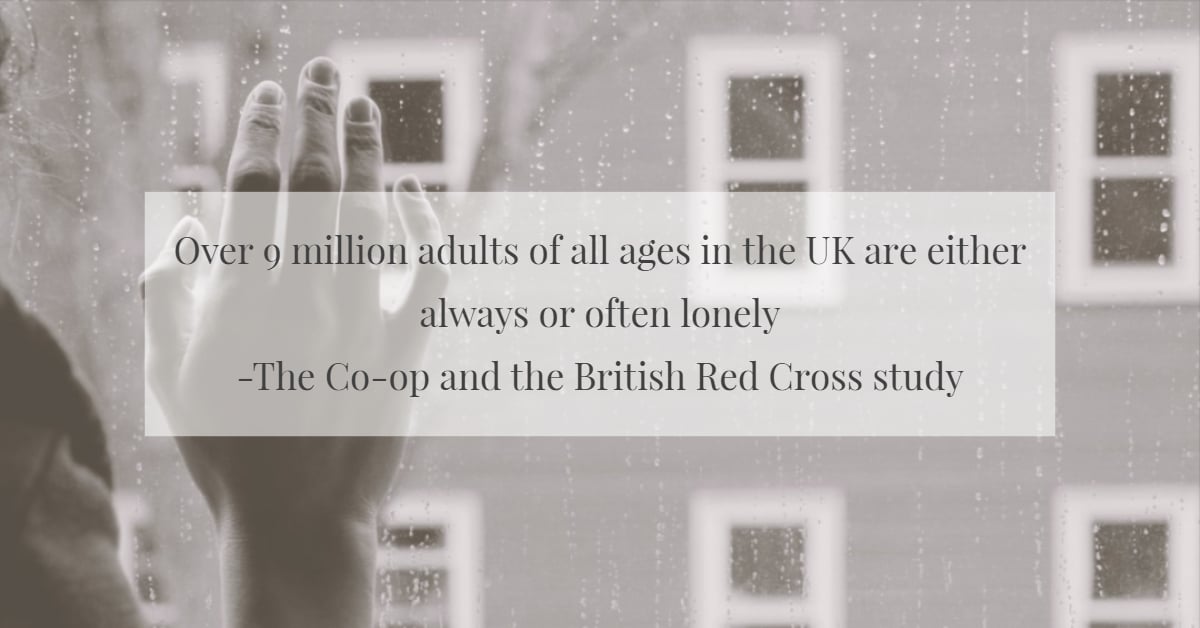Loneliness and Isolation: The reality

Published on 29 October 2019 12:57 PM
Welcome back to our blog!
This blog post will focus on the loneliness and isolation epidemic sweeping our nation, causing millions of people to go days, weeks and even months without speaking to another person. Human interaction is something that we take for granted on a regular basis, and something that millions of older people long for.
Take a few minutes now to sit in complete silence…
That silence is the reality for some people all day, every day.
Are loneliness and isolation the same?
Although loneliness and isolation are closely linked, they are not the same. Loneliness in my mind is the feeling of being disconnected, not just physically but also mentally, from the world. This loneliness can cause mental health problems including depression and anxiety, which can result in a person isolating themselves from society. Isolation on the other hand is different because someone can be isolated, physically or mentally, but be happy in their life and not feel lonely because of it.
Loneliness can affect people of all ages, but when people experience loneliness in later life they often do not have many people to turn to. With families living in different cities and countries, losing friends and a lack of confidence to join new groups and meet new people, loneliness is more prevalent than ever.
Loneliness is more common than you think…
A 2018 survey from The Economist and Kaiser Family Foundation (KFF) found that more than two out of ten adults in the UK say that they often feel lonely or lack companionship. This staggering figure means that around 20% of adults in the UK are experiencing this loneliness epidemic and highlights the need for us to talk about it and work towards eradicating it completely.
Not only can loneliness over long periods affect your mental health, but it has also been linked to premature death in extreme circumstances, impacting a person’s health similarly to obesity and smoking according to the NHS. So why do we not pay attention to this as much as we do to smoking and obesity health impacts?
How can I help to tackle the loneliness epidemic?
Loneliness is not a physical object that people carry around with them on a daily basis, so you may not know if someone is experiencing loneliness or not. However, if you know that someone lives alone or you often see them out and about not talking to anyone you could start a conversation with them. This conversation could be the first contact they have had with anyone in weeks.
Cadbury recently set up the Donate Your Words campaign to highlight loneliness that over 225,000 over 65s experience on a daily basis, going whole weeks without speaking to another person. Removing the words from the front of their iconic Dairy Milk bar supports Age UK, donating 30p of each bar to Age UK which will help to provide services that will support lonely and isolated people across the nation. Initiatives like this raise awareness on local and national levels, and allow you to contribute towards a worthy cause by simply buying a chocolate bar.
Additionally, you can offer support by volunteering for local charities if you have the time to do so. Loneliness effects people of all ages and in all walks of life including older people, those living on the streets, university students who have moved away from home and people who simply live alone. If you can give time to a charity that helps one of these groups, it can make an amazing difference and help to support those in need in our communities.
It could be you one day…
We cannot predict when loneliness will occur but ensuring that you have a good support system around you, such as friends, family and local community group/charity/organisation contacts enables you to know that should you fall on hard times you can contact someone to help. We are all aging every single day, and one day we may feel the loneliness that many face day-in day-out.
You would want to be supported and know that you have someone to turn to, so make sure that you are there for the people in your community who may feel this way. A simple hello, cup of tea or phone call can make a massive difference to someone’s day and can improve their mental health and feelings of isolation and loneliness.
See you soon…
I hope you found this blog post insightful and eye-opening, small gestures can go a long way. This should be remembered particularly over the Christmas season.
See you soon, B
